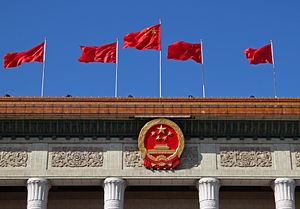This month Foreign Policy published an article co-authored by Daniel Bell entitled, “Is the Chinese Model Better than Democracy?,” an edited excerpt of an October 16 panel discussion hosted by Asia Society’s ChinaFile.
Bell is a professor at Tsinghua University and author of the lately released book The China Model: Political Meritocracy and the Limits of Democracy. In a coruscating dialogue, he describes the Chinese system as a “vertical democratic meritocracy.”
“If you have a small political community the issues are fairly easy to understand,” Bell explains, “and you know the moral character of the leaders you’re choosing, thus making a strong case for democracy at the lower level.”
But at the higher level, he says, issues are harder to understand and the stakes are much greater, making a case for meritocracy. However, he concedes that vertical democratic meritocracy doesn’t yet fully exist in China because village-level democracy remains flawed.
Panel member Timothy Garton Ash, professor of European studies at Oxford University, adds that national-level meritocracy doesn’t really exist in China either, describing China as rife with “massive factionalism, factional struggle, clientelism, patronage and corruption.”
China’s political system is a work in progress, but Bell argues that the floor plan is as good as Western democracy’s. Back in May, while acknowledging worsening political repression under Xi, he added, “Arguably, the Chinese political system is the most competitive in the world today.”
He was referring to its excruciating examination and political selection process, ostensibly the Chinese rungs of political ascension. But one objection, raised by Ash, is that this is precisely what’s so delusive. The selection process in reality is compromised by factionalism and corruption. The guanxi of “princelings,” like Xi, credits that argument. But Bell reminds us that the princelings rose to power before political examinations were institutionalized in the 1990s.
Besides, democracy too is replete with political families. The U.S. is potentially facing a second President Clinton, or a third President Bush. South Korea’s President Park Geun-hye is the daughter of one of its former dictators. Bolivia, Chile, and Colombia have each elected three generations of families to president. The Cannon-Powers of Canada have produced 11 politicians, the Nehru-Gandhis of India have produced 15 and the Sassou-Nguesso-Bongos of Gabon have produced 20.
Another objection to the claim that Chinese politics are competitive is that a one-party system has as much competition as a single-runner race, but Bell anticipates this too, arguing that multiparty systems compel politicians to spend more time campaigning and less time doing their jobs. Again, these words ring especially true given the current U.S. presidential campaign season.
A recent Sun Sentinel article called for Senator Marco Rubio’s resignation over the number of Senate votes he’s missed while campaigning. During the Republican debate in Colorado, Rubio replied that he isn’t alone, and indeed, Politico reports, in the 2007 presidential campaign senators John McCain, Barack Obama, and Hillary Clinton also missed votes — 56 percent, 38 percent and 23 percent, respectively.
Yet a third objection comes from panel member Taisu Zhang, associate professor of law at Duke University, who asserts that Bell is unfairly asking which system best provides “good governance,” when Western democracy is in fact more concerned with “the democratic ideal of one person, one vote, of representative government.”
But even if we reframe the comparison thus, the power of special interest groups in the U.S. corrupts that ideal at least as much as cronyism corrupts Chinese meritocracy.
Finally, Andrew Nathan, another panel member and a professor of political science at Columbia University, questions whether meritocracy is even desirable. What really matters, he says, isn’t how you choose good leaders but how you ensure they remain good once they’re chosen. Here, the U.S. system seems to win with its checks and balances, but this blade swings both ways, because partisanship and the cost of election cycles cuts deeply into how much good elected officials can actually do. As Bell points out, Xi and Obama have both promised to cut pollution.
“Who is more likely to stick to that pledge?” he asks. “The United States may set aside its promise if the Republicans win the presidency in 2016. No such worries in China, unless the political system collapses.”
China’s tragic flaw, Bell concludes, is political repression. He posits that Xi’s anti-corruption campaign has angered many who must, for the sake of its success, be silenced. I defended China’s meritocracy for the September magazine, but this is where I disagree with Bell.
Incarcerating feminists or Nobel laureates has nothing to do with fighting corruption. It’s the despotic protection of political power at the expense of innocent Chinese, and further evidence that China’s meritocracy, like U.S. democracy, is a glorious project but still little more than what Gandhi allegedly called Western civilization — “a good idea.”
































